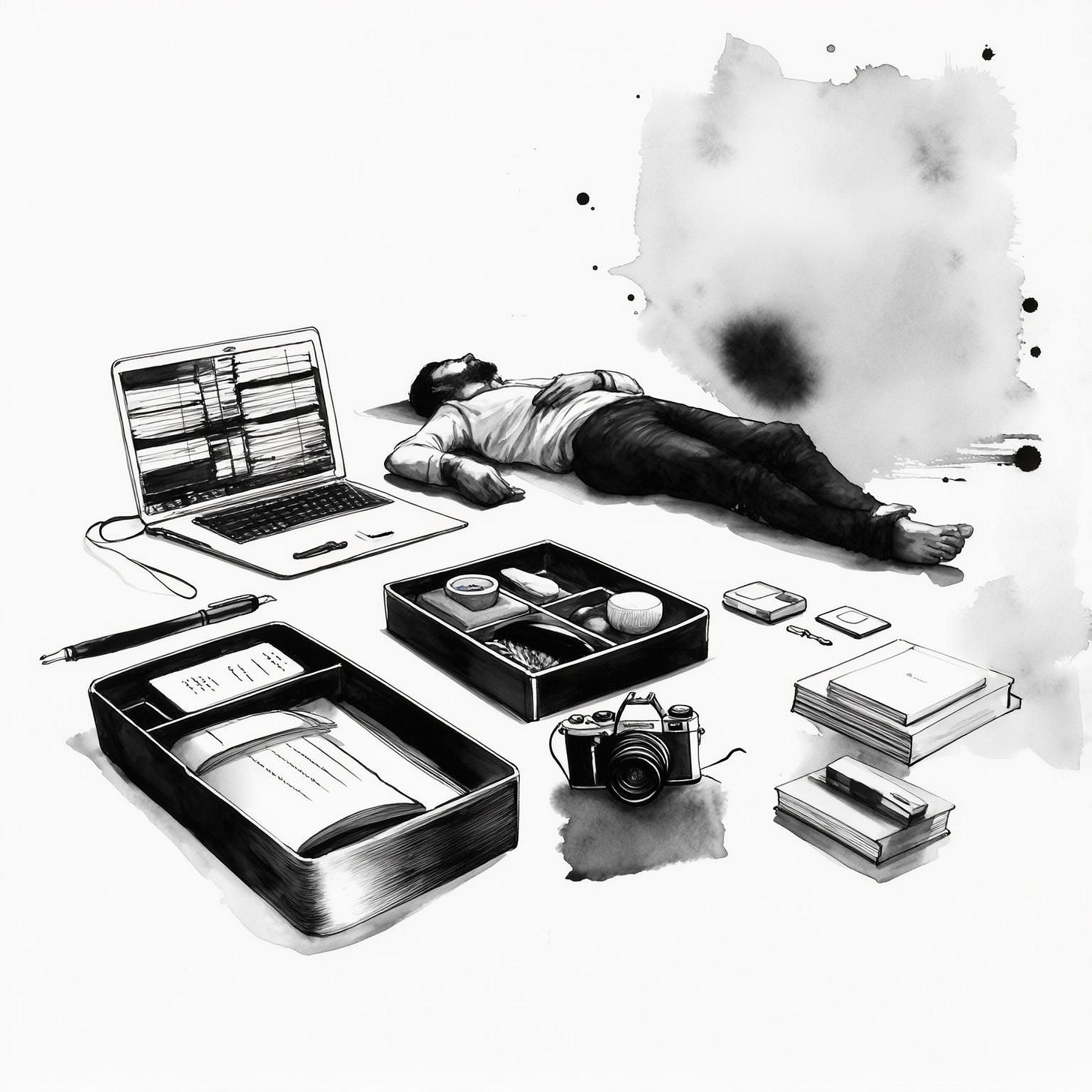Tools make you efficient, you make yourself effective
Why the latest software and tools can make you more efficient, but not necessarily any more effective
The clearest sign of a newbie in any creative field is when their first question is, "Which tools are you using?"
It’s only natural. I get it because that was usually my first question when I started any creative endeavor.
Designing posters? Photoshop or CorelDraw?
Editing Videos? Adobe Premiere Pro, Windows Movie Maker, or Vegas Pro?
Filming videos? Nikon or Canon; Kit lens, Zoom lens, or Prime lens, which focal length?
Guitar? Yamaha, Gibson, Les Paul, Epiphone, or a no-name brand?
Piano? Yamaha or Casio, digital keyboard or an upright piano
Music Production? Logic, Abelton, or Fruity Loops (now FL Studio)?
Programming? Which framework?1
Underlying the question was an implicit expectation that the tool will compensate for my lack of skill and would magically create an output better than my beginner skills.
If you talk to the pros they’ll tell you, it matters not which tools you use, especially at the start. When you’re starting out, use the tools that are available.
Tools will not determine your greatness, you will.
Consider the Sistine Chapel:

Despite modern advancements over the past 500 years, Michelangelo's masterpiece remains unparalleled. What makes it incredible is the technique, skill and vision, not the brushes and the paint.
True artistry transcends tools.
Tools give you leverage to do the work better, faster, and cheaper, but they can't tell you if the work will be meaningful, valuable, or worth doing at all.
Tools can't tell you what to create or what people will like. Only you can decide what to work on. Only you can decide what signals to act on.
Tools can make you efficient; you make yourself effective2.
Take Disney for example.

Today's animation technology is infinitely better than 100 years ago. The artists and animators are arguably 100s of times more efficient in creating and animating the scenes. The films are certainly more detailed, much larger in scale, and have visuals that were impossible decades ago.
Does this mean Disney is any more effective in creating lovable films that will endure?
Are any of their recent films as memorable as the studio's beloved classics like 1937's Snow White and the Seven Dwarves?
Tools can make you efficient; how you use them determines your effectiveness.
The chasm between the Physical and the Digital
Professionals know that tools are just a multiplier of your skills. Without the underlying skills, tools are useless.
We understand this intuitively with physical tools.
I have no experience in carpentry and I’m not skilled with a saw. Giving me a power saw will make me much more efficient at cutting things than a saw, but no more effective in creating useful furniture. Worse, my effectiveness might be negative, as using it incorrectly could leave me without a couple of fingers.
Yet, with digital tools, that understanding seems to be absent.
Worse, we might shift the blame to the tools instead of our ineffectiveness in using them to further our goals.
If I cut my finger using a power saw, I wouldn't blame the saw for it, I would blame my own lack of skill. But with digital tools like smartphones and social media, we’re all too happy to blame the algorithms.
It’s true that Social media is addictive. Billions of dollars have been spent on the algorithms to keep you hooked for as long as possible. But what is usually not discussed enough is that the algorithms are only giving you what you want.
No addiction takes hold without continued consent of the individual.
You can walk away from your tools any time you choose.
Smartphones are incredible tools that help us save memories, find our way with maps, find any information at any time, connect with our loved ones across the Atlantic, and much more. Simply removing social media apps from them removes their addictive nature.
But even social media, for all its addictive features, is an incredibly useful tool.
When used correctly, it lets you find your tribe, build your business, and indulge your curiosity all while munching on some delicious memes. It's the excessive and un-intentional use of social media that causes problems.
The efficiency of new age tools
Most tools, physical or digital have a learning curve. The most complex ones often require hundreds of hours of training to build the skills needed to use the tools effectively. Like AutoCAD for construction design, or Blender for 3D modeling.
The latest digital tools, though, are different.
They can improve your output without any skills. And like traditional tools, they have no addictive component.
They require no more than a description to generate screenplays, create songs, or create a movie scene, or award-winning artwork.
The new-age AI tools abstract away the thousands of hours needed to learn the underlying skills to create a beautiful image, a catchy song, or a moving movie and generate the output at literally the stroke of keys on your keyboard.
New age tools let you create at the speed of thought
Their output might not be too creative or even good, but they reduce the friction in getting started and allow you to iterate fast. And they are getting better at a rapid clip.
They increase your efficiency to an extent that was impossible a couple of years ago. Anyone can write a long blog post in an instant, summarize documents in an instant, and create images that would've taken tens or hundreds of hours to create. The same goes for audio and video.
What about effectiveness?
Do new age tools make you any more effective than before? Not necessarily.
For one, the ease of creation creates a cacophony of competition.
If you’re a creative, your work now must be truly exquisite to stand out in the crowded sea of endless competition from all the new creators.
But there are people making millions using AI and there are people whose lives have changed little from AI.
This is because efficiency is determined by tools, but effectiveness is determined by you.
When tools are used correctly, you can be vastly more efficient and effective!
When people say any new software will make you more productive, what they are saying is it you it will make you more efficient. AI helps you write a blog post in 1 minute.
Whether it helps you with your goals still depends on you because effectiveness depends completely on you.
Effectiveness depends on what you're trying to achieve.
Effectiveness is progress towards your goals.
If you aim to start a coffee shop, and you use AI to generate descriptions of your coffee, posters for the shop and you use social media to promote your new shop to reach more customers, you're using these tools to become more effective, while being efficient as well.
Direction before speed
To be effective, you need to know where you're going and then use tools to help you get there faster.
A car is much faster and much more efficient than a bicycle in terms of moving from point A to point B.
If you want to visit your grandma, who lives two hours away, the car is more efficient and effective.
If your aim is to just explore a wide trail through a wooded area to explore the scene, the bicycle, while being an in-efficient mode of transport, is still a much more effective tool since it helps you explore the forest better.
Whether you have a bicycle or a Ferrari - if you don't know your destination, you will only get lost faster.
Even when you don't know your direction, you can still use tools to figure out your direction faster.
The faster you iterate, the more information you'll get on what works and does not. Tools can help you iterate faster, eliminate uncertainty, and understand which direction you need to pursue. Then, you can decide which tools truly aid your effectives.
A saw is of little use in my hand and magic in a skilled carpenter's hand.
Tools only work when you do3.
Effectiveness in using tools depends on the user’s skill level and on what they want to create and whether the tools help them get closer to their goals.
As we grapple with the implications of AI and its vast web of impact on our day to day lives, it’s worthwhile to consider how we can wield it to help us achieve what we want.
Tools make you efficient. You decide how they make you effective.
Tools I use now
Designing posters? Figma
Editing Videos? Davinci Resolve
Filming videos? BMPCC 4k, with an 18-35mm Sigma f1.8 Art DC lens
Guitar? Acoustic: Custom made left-handed, Electric: Fender Stratocaster
Piano? Yamaha P45B
Music Production? FL Studio
Programming? Python, Django; JavaScript, Vue / React
As a general principle, once you’ve started putting in the work, always buy the best tools you can afford.



